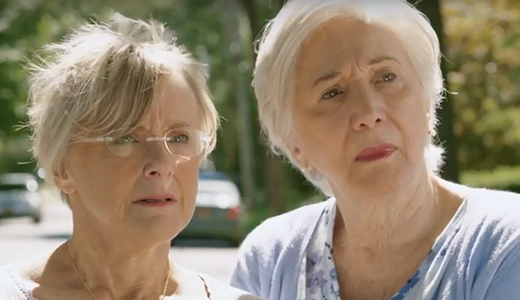Plugged In reviews a lot of movies. My cohorts and I probably write about 200 reviews every year, covering just about every movie you’re likely to see in the local multiplex.
And we just scratch the surface.
More than 730 movies were released in 2017, most of them under-the-radar indie films or special-interest flicks. We can’t see ’em all, of course. And while many are probably not films we’d be particularly interested in, sometimes gems get lost in the shuffle.
I had an opportunity to see such a gem recently—and talk to its director, Dianne Dreyer, who’s worked on Oscar-winning films (The English Patient) and box-office winners (A Quiet Place) and co-produced the upcoming drama Ben is Back.
But the film I saw marks her directorial debut, and it’s an interesting debut indeed. The name of the film is Change in the Air, and it’s a quirky, ultimately inspirational, PG-rated comedy with a strong cast, including Rachel Brosnahan (who stars in Amazon’s Emmy-winning show The Marvelous Mrs. Maisel), Mary Beth Hurt, Macy Gray and Oscar-winner Olympia Dukakis.
The movie takes place in a quiet, elderly, suburban neighborhood. One woman, Jo Ann (played by Hurt), builds a coffin in her basement. A man, Walter, gets hit by a car in the movie’s opening moments—perhaps on purpose. He survives, but he spends the rest of the movie sitting in his front yard, watching the world go by. You get a sense that the neighborhood’s elderly residents are waiting for something … perhaps waiting for the end.
But then a young, mysterious woman named Wren (Brosnahan) moves in, and it’s as if the neighborhood has gotten a transfusion of life. She fascinates her neighbors. They speculate about why she gets bags and bags of mail, or why she seems to have an inexplicable fear of the police. But as they wonder about her, their own mysteries begin to burble closer to the surface, too,their own hidden pains.
“The movie is talking about forgiveness, beginning with yourself,” Dreyer told me. “And the idea that you have to let go of something before healing can even begin. I think that’s true in life, and that doesn’t necessarily mean that you’re going to heal quickly if at all. But the step has to be initiated by you.”
Dreyer was drawn to the movie for lots of different reasons, but she was particularly intrigued by the film’s suggestion that there’s a hidden purpose behind who you meet and the events you experience—even the tragic ones. She believes in that purpose passionately. And even though she understands why some recoil at the very notion, she has personal experience in finding that purpose.
Dreyer’s brother died when he was just 18 years old. “Of course I couldn’t say that in the moment, but I have come to view that as the most pivotal, critical, positive event in my life,” she says. “I don’t think I would’ve become the woman I became without having to endure that loss and go through it with my family.”
She adds that her best friend, Gail, experienced a similar tragedy five years before Dreyer’s brother died. “I would be dishonest if I said knowing her and watching her navigate that terrible time in her life wasn’t preparation for me,” she says. “Who would’ve known that five years later I was going to be coping with the exact same thing? I don’t think it’s an accident, Paul. I just don’t.”
Dreyer was raised Catholic, though her stepfather—the man Dreyer considers to be her real father—was Jewish. “I’ve never met anyone who had the moral high ground the way that he did,” she says. “He encouraged us in such simple and fun ways—this idea of contemplation, reflection on your day, prayer.”
And he loved to do things as a family. They’d all eat dinner at the table together. They’d watch the same television shows together. After dinner, he and his kids would often go down and work on a jigsaw puzzle together. Now, Dreyer realizes that her dad wasn’t as interested in the puzzle as he was about talking with his children. “I wasn’t really conscious of it at the time, but it was a way he could talk to us children and hear what’s going on in our lives without in any way being confrontational,” she says. “Because you’re just trying to find puzzle pieces.”
And, of course, Dreyer’s father took her and her siblings to movies, too. The movies he chose helped shape how Dreyer thought about movies, too.
“[My dad] never thought anybody should pay money to be made sad,” she says. “His idea was that there was so much heartbreak around us every day, and people who need our help and our attention and our charity. Why would I pay money to go watch a movie about something that’s going to break my heart? He really wanted to only take us to movies that were either funny or uplifting in some way.
“I wish he had survived to see me make my first film,” she says. “Because even though there’s an element of sadness, in general, I think it’s a very uplifting story.”
Change in the Air isn’t perfect, of course. The PG film has some language concerns and a bit of sexual content. The dreamy, mystical conclusion of the film may rub a few the wrong way. But it is, indeed, an uplifting story—well-crafted and well-acted. It’s out this weekend in a handful of theaters across the country. And if you don’t see it playing in your neck of the woods, this might be one to keep in mind when it’s released on video.






Recent Comments